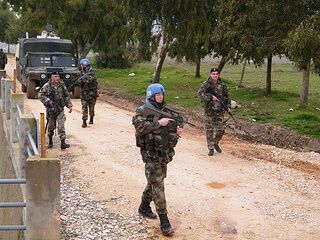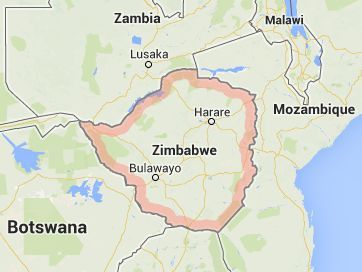Arab Spring Winter
• According to the Financial Times (via Google News), UNIFIL will likely feel the first backlash against the EU’s for for slapping a terror label on Hezbollah. Meanwhile, Reuters/Jerusalem Post reports that Turkey’s withdrawing some of its UNIFIL contingent. But the timing’s awkward for Ankara:
The announcement came the same day that a pilot for Turkish Airlines and his assistant were abducted by gunmen in Beirut . . .
Tenenti told NNA that Turkey had informed UNIFIL of the decision to withdraw its troops on August 6, three days prior to the abduction.

• Dr. Zonis Zeev, the head of the children’s ICU at Western Galilee Medical Center, to AP, on treating Syrian patients:
“Probably at some time they were told about the `animals’ on the other side of the border, us, like the Zionists or the Jews,” he said. “So they are terrified, and we have to treat the anxiety not less than treating the physical part. Sometimes it is much harder.”
• Syrian rebels claim they killed 40 Hezbollah/Iranian personnel in a Damascus car bombing.
• NY Times: Syrian rebels have abducted a lot of Western journalists this year.
Foreign reporters were initially welcomed by many insurgents and Syrian civilians, taken for advocates who could publicize grievances against President Bashar al-Assad. Now they are sometimes viewed as interlopers who have no stake in the outcome of the conflict, which has left more than 100,000 people dead.
Spreading economic desperation in Syria has increased the possibility of betrayal, extortion and abduction, according to news media advocacy and rights groups. Some translators, drivers and local guides have reported that criminal groups or jihadists have tried to recruit them to lure journalists into Syria with promises of scoops.
• For more commentary/analysis, see David Ignatius.
Iranian Atomic Urgency
• Zimbabwe is denying a Times of London report that it has agreed to sell uranium to Iran. Such a sale would be a direct breach of international sanctions, but if the report is true, dictator Robert Mugabe has nothing to lose politically:
Both countries are subject to international sanctions: Iran because of its nuclear ambitions; Zimbabwe because of human rights abuses by the ruling Zanu (PF) party . . .
Analysts said that the deal suggested that Harare was simply keeping its options open. It could be a long time before the uranium reserves, estimated at up to 45,000 tonnes, were ready for export. A geologist familiar with the deposit said that it was mixed with other minerals and groundwater, making extraction extremely costly.

• Iran continues making in-roads in Latin America. It all starts off with free religious studies classes that ultimately lead to “anti-Americanism and Islam.” And for some, even more, reports the Washington Post:
Regional experts say such “soft power” initiatives are mainly political, intended in particular to strengthen Tehran’s foothold in countries such as Venezuela and Ecuador, which share similar anti-American views. But in some cases, Iranian officials have sought to enlist Latin Americans for espionage and even hacking operations targeting U.S. computer systems, according to U.S. and Latin American law-enforcement and intelligence officials.
And the Miami Herald points out that the Iranian outreach has drawn Congressional scrutiny too.
• For more commentary/analysis, see Amos Yadlin (NY Times).
Rest O’ the Roundup
• Reuters and other news services report that the former head of Argentina’s central bank, Mario Blejer, is the leading candidate to replace Stanley Fischer as governor of the Bank of Israel.
• With Foreign Ministry workers’ sanctions suspended, diplomacy’s getting back on track, reports the Jerusalem Post.
• Not everyone all Israeli diplomats are happy with the IsraelintheGCC Twitter account. It put a spotlight on clandestine efforts to restore relations with the Gulf states which were broken in the aftermath of Israel’s 2009 war in Gaza. The Times of Israel explains:
Indeed, the secrecy surrounding Israel’s mysterious office in the Gulf goes so far that even senior diplomats, including those dealing on a daily basis with the GCC, gave The Times of Israel conflicting information about it. Some asserted that “we have absolutely nothing” in the Gulf and that the line in the budget must have been an error. Others admitted that there is — or was — something but declined to detail.
Not everyone in the Foreign Ministry is happy with the idea of establishing a “virtual embassy” to openly engage with the residents of the Gulf states via social networks. “This ‘virtual activity’ will put our tangible activity at risk,” one diplomat opined.
• The Economist takes a look at the state of the IDF in transition.
(Map of Rawabi via Rawabi.ps, UNIFIL via Flickr/Irish Defense Forces, Twitter via Flickr/thethreesisters)
For more, see Thursday’s Israel Daily News Stream.
[sc:bottomsignup]
